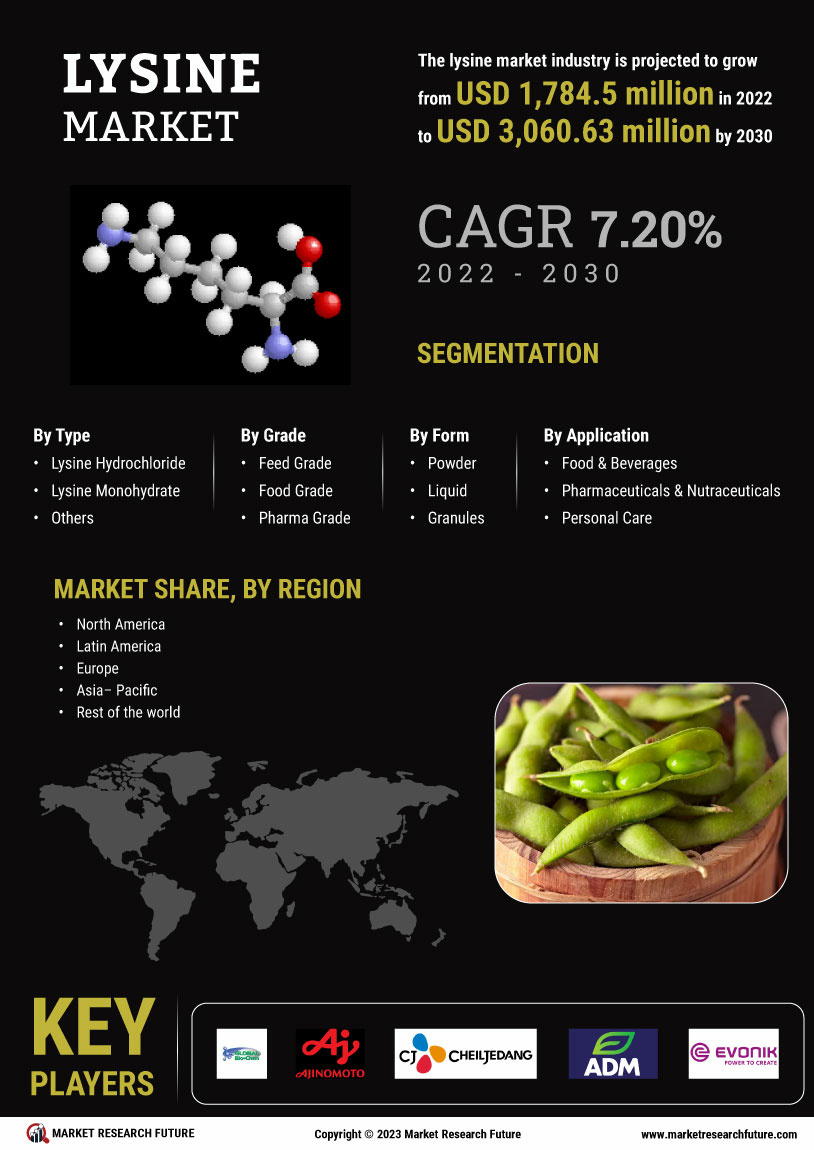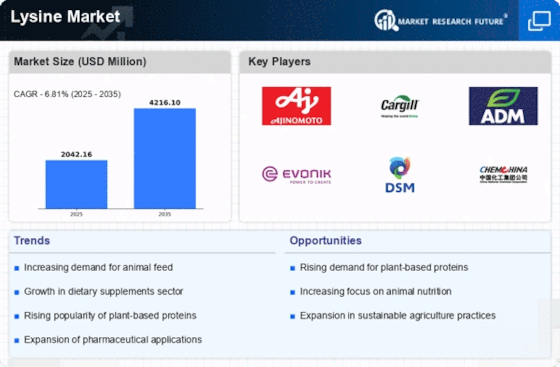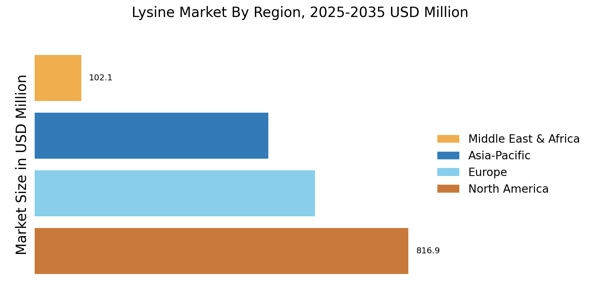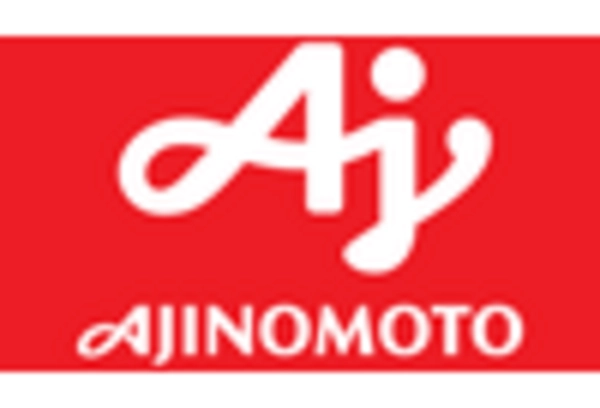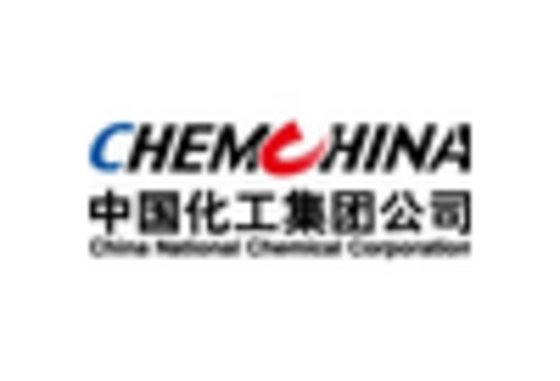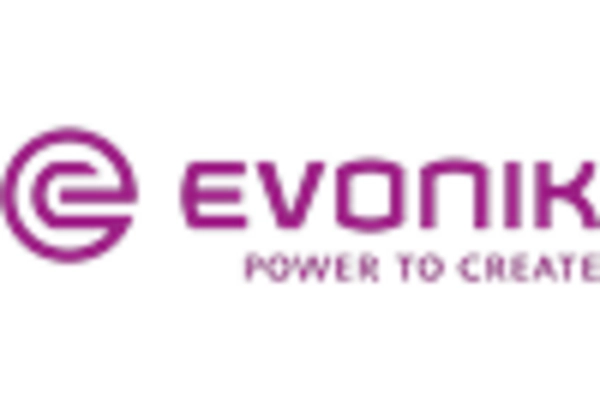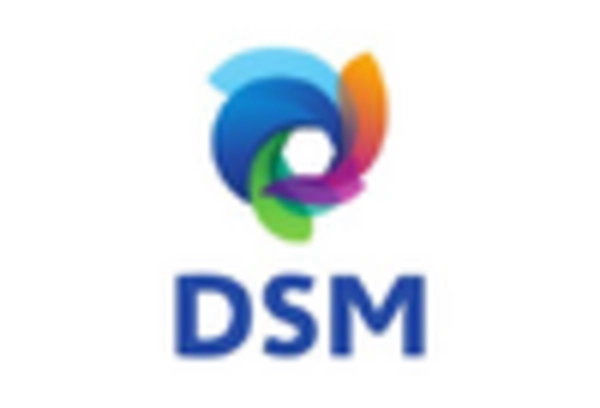Expansion de l'aquaculture
Le marché de la lysine connaît une expansion significative dans l'aquaculture, qui devient une source vitale de protéines pour la consommation humaine. À mesure que les pratiques d'élevage de poissons évoluent, la demande pour des aliments de haute qualité incluant des acides aminés essentiels comme la lysine augmente. Le secteur de l'aquaculture devrait croître à un taux de croissance annuel composé d'environ 5 % au cours des prochaines années, ce qui stimule davantage le besoin en lysine. Cette croissance est attribuée à la sensibilisation croissante aux bienfaits pour la santé associés à la consommation de poisson et à la nécessité de sources alimentaires durables. Par conséquent, l'intégration de la lysine dans les formulations d'aliments pour aquaculture devrait améliorer les performances de croissance et les ratios de conversion alimentaire, soutenant ainsi la croissance globale du marché de la lysine.
Conscience de la santé en hausse
Le marché de la lysine est également influencé par la prise de conscience croissante de la santé parmi les consommateurs, ce qui entraîne un intérêt accru pour les compléments alimentaires. Le marché de la lysine est reconnu pour ses avantages potentiels pour la santé, notamment le soutien de la fonction immunitaire et la promotion de la récupération musculaire. À mesure que de plus en plus d'individus cherchent à améliorer leur apport nutritionnel, la demande de compléments à base de lysine devrait augmenter. En 2023, le segment des compléments alimentaires représentait environ 15 % du marché total de la lysine, indiquant une tendance croissante. Ce changement vers la santé préventive et le bien-être est susceptible de créer de nouvelles opportunités pour les fabricants de lysine, alors qu'ils adaptent leurs offres pour répondre aux préférences évolutives des consommateurs soucieux de leur santé.
Innovations technologiques dans la production
Le marché de la lysine bénéficie des innovations technologiques dans les processus de production, qui améliorent l'efficacité et réduisent les coûts. Les avancées dans la technologie de fermentation et l'ingénierie génétique permettent aux fabricants de produire de la lysine de manière plus durable et à un prix inférieur. Par exemple, le développement de souches microbiennes à haut rendement a amélioré les taux de production de lysine, la rendant plus accessible à divers secteurs. En 2023, la capacité de production de lysine a atteint environ 1,5 million de tonnes métriques, reflétant l'impact de ces innovations. À mesure que les méthodes de production continuent d'évoluer, le marché de la lysine devrait connaître une concurrence accrue et une gamme d'applications plus large, stimulant ainsi la croissance du marché.
Demande croissante pour les aliments pour animaux
Le marché de la lysine connaît une augmentation notable de la demande pour l'alimentation animale, principalement alimentée par le secteur de l'élevage en pleine croissance. Alors que la population mondiale continue d'augmenter, le besoin de sources alimentaires riches en protéines croît, entraînant une consommation accrue de viande et de produits laitiers. Le marché de la lysine, étant un acide aminé essentiel, joue un rôle critique dans la nutrition animale, améliorant les taux de croissance et l'efficacité alimentaire. En 2023, le segment de l'alimentation animale représentait environ 80 % de la consommation totale de lysine, indiquant son rôle central dans l'industrie. De plus, l'augmentation de la consommation de viande dans les régions en développement devrait renforcer la demande de lysine dans l'alimentation animale, propulsant ainsi le marché de la lysine vers l'avant.
Soutien réglementaire pour les normes nutritionnelles
Le marché de la lysine est positivement impacté par le soutien réglementaire aux normes nutritionnelles dans l'alimentation animale et la nutrition humaine. Les gouvernements et les organismes de réglementation reconnaissent de plus en plus l'importance des acides aminés comme la lysine dans la promotion de la santé et de la productivité. Ce soutien conduit à l'établissement de directives qui encouragent l'inclusion de nutriments essentiels dans les formulations d'aliments. Par exemple, plusieurs pays ont mis en œuvre des réglementations qui imposent des niveaux minimaux de lysine dans les régimes alimentaires des animaux, ce qui stimule la demande dans le secteur de l'alimentation. À mesure que ces réglementations deviennent plus strictes, le marché de la lysine est susceptible de connaître une croissance, alors que les fabricants s'efforcent de se conformer à ces normes et d'améliorer la qualité nutritionnelle de leurs produits.
